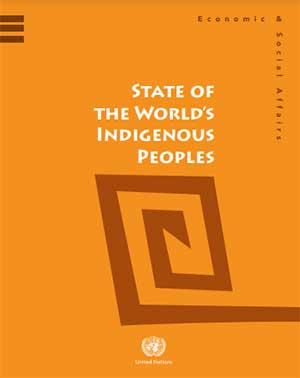The State of the World’s Indigenous People report of United Nations
An important UN report has been published recently which says that Although the world’s indigenous peoples live in areas that contain around 80 per cent of the planet’s biodiversity, many still struggle to maintain their legal rights to lands, territories and resources. The report has been released by UN Department of Economic and Social Affairs (DESA) which says that Indigenous people are often described as “the custodians of our Earth’s precious resources”.
Indigenous peoples’ rights to lands, territories & resources should be Central to Agenda 2030 or SDG goals.
Ensuring the collective rights of indigenous peoples to lands, territories and resources is not only for their well-being, but also for addressing some of the most pressing global challenges such as climate change and environmental degradation”.
This United Nations report report examines challenges communities face in asserting their rights to lands, whether in the context of agribusiness, extractive industries, development, conservation and tourism.
It is mention worthy here that The United Nations Declaration on the Rights of Indigenous Peoples (UNDRIP) was adopted by the General Assembly on Thursday, 13 September 2007, by a majority of 144 states in favour, 4 votes against (Australia, Canada, New Zealand and the United States) and 11 abstentions (Azerbaijan, Bangladesh, Bhutan, Burundi, Colombia, Georgia, Kenya, Nigeria, Russian Federation, Samoa and Ukraine.
It establishes a universal framework of minimum standards for the survival, dignity and well-being of the indigenous peoples of the world and it elaborates on existing human rights standards and fundamental freedoms as they apply to the specific situation of indigenous peoples.
International Decade of the World’s Indigenous People (1995-2004) and the Second International Decade of the World’s Indigenous Peoples (2005-2015) has been a tool to propogate the right awareness of indigenous people.
Indigenous peoples have the right to the full enjoyment, as a collective or as individuals, of all human rights and fundamental freedoms as recognized in the Charter of the United Nations, the Universal Declaration of Human Rights and international human rights law.
Indigenous peoples and individuals are free and equal to all other peoples and individuals and have the right to be free from any kind of discrimination, in the exercise of their rights, in particular that based on their indigenous origin or identity.
Article 10 of the United Nations Declaration on the Rights of Indigenous Peoples says that , Indigenous peoples shall not be forcibly removed from their lands or territories. No relocation shall take place without the free, prior and informed consent of the indigenous peoples concerned and after agreement on just and fair compensation and, where possible, with the option of return.
Article 24 of the declaration says that the Indigenous peoples have the right to their traditional medicines and to maintain their health practices, including the conservation of their vital medicinal plants, animals and minerals. Indigenous individuals also have the right to access, without any discrimination, to all social and health services.
Indigenous individuals have an equal right to the enjoyment of the highest attainable standard of physical and mental health. States shall take the necessary steps with a view to achieving progressively the full realization of this right.
Article 26 of the UN declaration on Rights of indigenous peoples says that Indigenous peoples have the right to the lands, territories and resources which they have traditionally owned, occupied or otherwise used or acquired. Indigenous peoples have the right to own, use, develop and control the lands, territories and resources that they possess by reason of traditional ownership or other traditional occupation or use, as well as those which they have otherwise acquired.
States shall give legal recognition and protection to these lands, territories and resources. Such recognition shall be conducted with due respect to the customs, traditions and land tenure systems of the indigenous peoples concerned.







